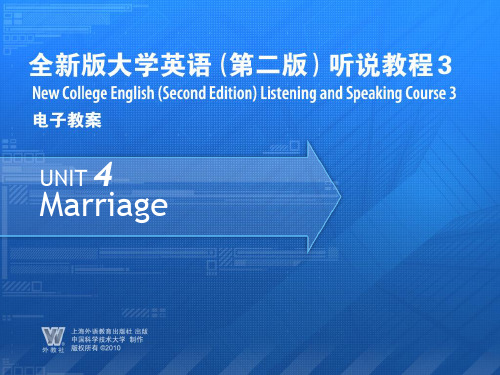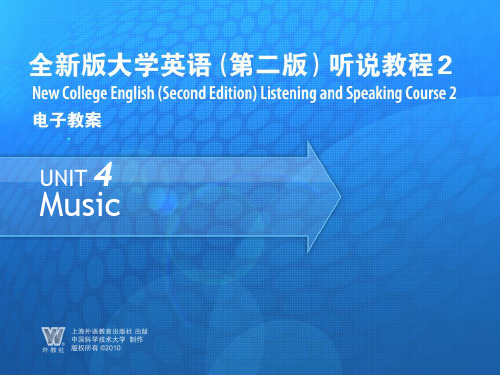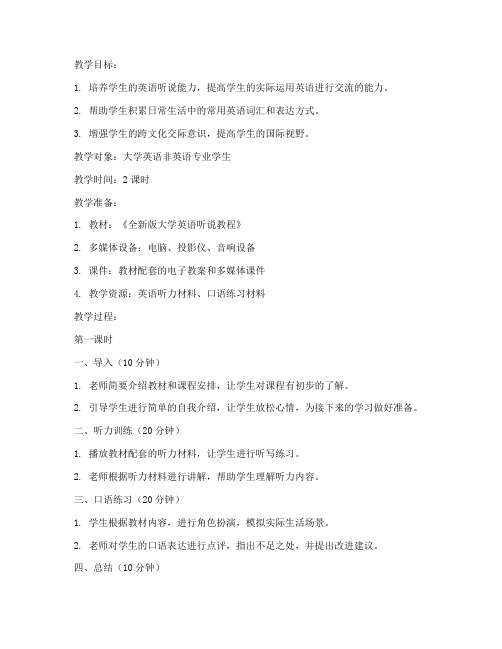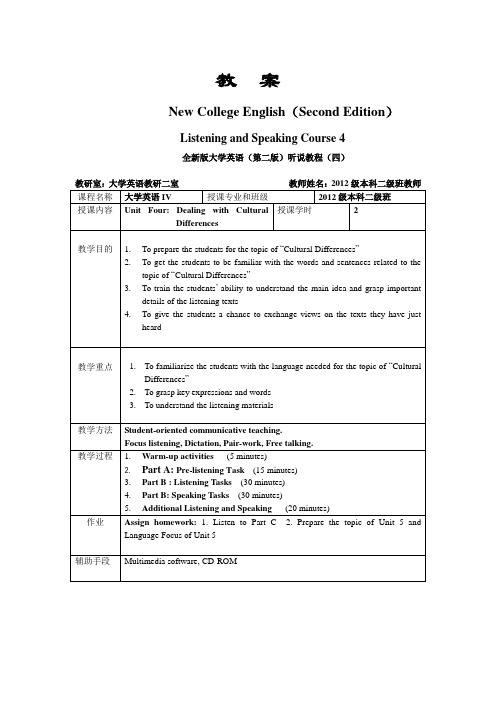全新版大学英语听说教程Unit电子教案
全新版大学英语(第二版)听说教程3电子教案 unit4

Unit 4 Marriage
Pre-listening Task Language Focus
• Trouble starts in a marriage when one partner keeps complaining about small things, making the other feel resentful. • Constantly criticizing your partner and his or her family gives rise to troubles in / may destroy a marriage. • Lack of understanding / tolerance over differences may bring troubles to a marriage / cause a marriage to fail.
Unit 4 Marriage
Pre-listening Task Language Focus
• It’s very important for husband and wife to show appreciation of each other / talk and get to know what his or her partner expects. • A marriage agreement sounds too practical / lacks romantic flavor / reduces marriage to mere business. • I think a written marriage agreement shows how much you and your partner are going to respect each other’s needs and expectations / promises a harmonious relationship in married life.
全新版大学英语(第二版)听说教程2-Unit4电子教案

1. Do you like music? What type of music do you like best? Traditional Chinese music or Western music? Classical or popular? 2. Who is your favorite singer / composer? 3. Do you play any musical instrument? If you do, what is it? How long have you played it? If not, what instrument would you like to learn to play? 4. What do you think is the value of music?
Unit 4 Music
Listening Strategy
The signal words in the passages you have heard may perform the following functions: a. leading towards a statement that is a contrast or an opposite to what has been said b. summarizing what has been said c. setting out the stages of the talk d. suggesting cause and effect _____________ 1. However; a 2. _____________ Because; d _________________________ 3. Firstly, then, finally; c 4. _____________ In short; b
全新版大学英语听说1教案

课程名称:全新版大学英语听说教程1授课对象:大学英语一年级学生课时:2课时教学目标:1. 培养学生基本的英语听说能力,提高学生的口语流利度和准确性。
2. 帮助学生掌握英语日常交际用语,增强在实际交流中的自信心。
3. 培养学生自主学习的能力,提高学生的综合英语素养。
教学内容:1. 日常交际用语2. 听力技巧训练3. 口语练习教学过程:第一课时一、导入1. 教师与学生用英语进行简单的自我介绍,活跃课堂气氛。
2. 教师简要介绍教材内容和教学目标。
二、新课导入1. 介绍本课主题:日常交际用语2. 学生阅读课文,了解相关知识点三、听力训练1. 学生听录音,完成听力练习2. 教师讲解听力技巧,指导学生如何提高听力水平四、口语练习1. 学生根据课文内容进行角色扮演2. 教师指导学生如何运用所学交际用语进行实际交流五、课堂小结1. 教师总结本课所学内容2. 学生分享学习心得第二课时一、复习导入1. 教师提问,检查学生对上一节课内容的掌握情况2. 学生复述上一节课所学交际用语二、新课导入1. 介绍本课主题:听力技巧训练2. 学生阅读课文,了解相关知识点三、听力训练1. 学生听录音,完成听力练习2. 教师讲解听力技巧,指导学生如何提高听力水平四、口语练习1. 学生根据课文内容进行角色扮演2. 教师指导学生如何运用所学交际用语进行实际交流五、课堂小结1. 教师总结本课所学内容2. 学生分享学习心得教学评价:1. 学生在课堂上的参与度和积极性2. 学生对所学内容的掌握程度3. 学生在实际交流中的运用能力教学反思:1. 教师根据学生的反馈,调整教学方法和内容2. 教师关注学生的学习需求,提高教学质量3. 教师鼓励学生自主学习,培养良好的学习习惯。
全新版大学英语(第二版)听说教程1-unit2电子教案

Unit 2 Fun with Language
Communicative Function Listening Strategy Useful Expressions Notes
2. a. Opening b. Closing
Unit 2 Fun with Language
Communicative Function Listening Strategy Useful Expressions Notes
3. a. Opening b. Closing
Unit 2 Fun with Language
Unit 2 Fun with Language
Communicative Function Listening Strategy Useful Expressions Notes
1. a. Opening b. Closing
Unit 2 Fun with Language
Communicative Function Listening Strategy Useful Expressions Notes
5. a. Opening b. Closing
Unit 2 Fun with Language
Communicative Function Listening Strategy Useful Expressions Notes
6. a. Opening b. Closing
Unit 2 Fun with Language
Communicative Function Listening Strategy Useful Expressions Notes
4. a. Opening b. Closing
全新版大学英语听说教程3-Unit-7

Warm up
Preview
Name one of your former classmate or friend you would like to date and talk about why you are attracted by him or her.
Think of qualities that are important for a soul mate.
Unit 7 Personality
Listening Task
Check Vocabulary Knowledge
what someone is like = the personality and other qualities of a person (Note: “What is someone like?” is very different from “What does someone like?”) to try again = to get married again to have one’s own life = to be independent, knowing what one wants to do with one’s life
8. I’m not interested in making a __________ at this point in my life. I just want to have fun!
9. I don’t want somebody who’s so busy with work that he can’t spend _______ with me.
The students have an opportunity to talk about themselves and what they find appealing in others.
全新版大学听说教程教案

教学目标:1. 培养学生的英语听说能力,提高学生的实际运用英语进行交流的能力。
2. 帮助学生积累日常生活中的常用英语词汇和表达方式。
3. 增强学生的跨文化交际意识,提高学生的国际视野。
教学对象:大学英语非英语专业学生教学时间:2课时教学准备:1. 教材:《全新版大学英语听说教程》2. 多媒体设备:电脑、投影仪、音响设备3. 课件:教材配套的电子教案和多媒体课件4. 教学资源:英语听力材料、口语练习材料教学过程:第一课时一、导入(10分钟)1. 老师简要介绍教材和课程安排,让学生对课程有初步的了解。
2. 引导学生进行简单的自我介绍,让学生放松心情,为接下来的学习做好准备。
二、听力训练(20分钟)1. 播放教材配套的听力材料,让学生进行听写练习。
2. 老师根据听力材料进行讲解,帮助学生理解听力内容。
三、口语练习(20分钟)1. 学生根据教材内容,进行角色扮演,模拟实际生活场景。
2. 老师对学生的口语表达进行点评,指出不足之处,并提出改进建议。
四、总结(10分钟)1. 老师总结本节课的重点内容,强调学生在听说方面的进步。
2. 鼓励学生在课后继续练习,提高英语听说能力。
第二课时一、复习(10分钟)1. 复习上一节课的重点内容,检查学生对教材的理解程度。
2. 学生进行口语练习,巩固所学知识。
二、听力训练(20分钟)1. 播放新的听力材料,让学生进行听写练习。
2. 老师对听力材料进行讲解,帮助学生理解听力内容。
三、口语练习(20分钟)1. 学生根据教材内容,进行小组讨论,分享自己的观点和感受。
2. 老师对学生的口语表达进行点评,指出不足之处,并提出改进建议。
四、总结(10分钟)1. 老师总结本节课的重点内容,强调学生在听说方面的进步。
2. 鼓励学生在课后继续练习,提高英语听说能力。
教学反思:1. 教师在教学中应注重学生的主体地位,激发学生的学习兴趣。
2. 加强听力训练和口语练习,提高学生的实际运用英语进行交流的能力。
全新主题大学英语听说教程第1册课程设计

全新主题大学英语听说教程第1册课程设计一、课程简介全新主题大学英语听说教程第1册是针对初学者的英语听说教程。
本课程共16个单元,涵盖日常生活场景和常用语言表达。
学生通过听力和口语练习,增强听力和口语能力,提高日常交流的能力。
二、课程目标1.培养学生对英语的兴趣和信心。
2.提高学生的听力水平,能够听懂基础英语会话。
3.提高学生的口语水平,能够用基础英语表达自己的想法和理解他人的意思。
4.帮助学生在日常生活中应用所学知识,增强实际口语交流能力。
三、教学方法1.教师讲授+学生练习的交互教学方式。
2.引导学生在课堂上进行听力训练。
3.鼓励学生在分组中进行口语练习和对话模拟。
4.提供额外辅助材料和学习资源,以方便学生自主学习。
四、教学流程单元一课堂目标1.了解课程概况,提高学生对英语学习的兴趣和信心。
2.学习一些日常生活场景中的英语表达和基础语法。
1.介绍课程概况。
2.学习日常问候语。
3.学习基础语法——动词时态。
教学方法1.老师 introductions 课程内容,引出学生的兴趣。
2.给学生展示日常问候语,并引导学生进行模拟练习。
3.讲解动词时态,并带领学生进行相关演练。
课堂练习1.日常问候语的口语练习。
2.动词时态的练习。
辅助材料1.音频材料:日常问候语和动词时态的例句。
2.课堂ppt:介绍课程概况。
单元二课堂目标1.学习日常购物场景下的英语表达和数字的读法。
2.学习基础语法——名词和冠词的用法。
教学内容1.学习购物相关的英语表达。
2.学习数字的英语读法。
3.学习名词和冠词的用法。
1.给学生展示购物场景中的英语表达,并引导学生进行模拟练习。
2.给学生展示数字的英文读法,并进行讲解。
3.讲解名词和冠词的用法,并带领学生进行相关演练。
课堂练习1.购物场景下的口语练习。
2.数字的读法练习。
3.名词和冠词的使用练习。
辅助材料1.音频材料:购物场景下的英语语言模拟、数字的读法模拟。
2.课堂ppt:购物场景相关图片、数字展示。
全新版大学英语听说教程第四册教案Unit_4

Student-oriented communicative teaching.
Focus listening, Dictation, Pair-work, Free talking.
教学过程
1.Warm-up activities(5 minutes)
2.Part A:Pre-listening Task(15minutes)
6. What should we do before visiting other countries to avoid misunderstanding?
II.Part A:Pre-listening Task
1. Get the students to read the sentences in Language Focus after the tape:
3. How can failure to recognize cultural differences hinder communication?
4. How can we deal with cultural differences?
5. What does “culture shock” mean? In what ways can we cope with culture shock?
教案
NewCollegeEnglish(Second Edition)
Listening and Speaking Course 4
全新版大学英语(第二版)听说教程(四)
教研室:大学英语教研二室教师姓名:2012级本科二级班教师
课程名称
大学英语IV
授课专业和班级
2012级本科二级班
授课内容
授课学时
- 1、下载文档前请自行甄别文档内容的完整性,平台不提供额外的编辑、内容补充、找答案等附加服务。
- 2、"仅部分预览"的文档,不可在线预览部分如存在完整性等问题,可反馈申请退款(可完整预览的文档不适用该条件!)。
- 3、如文档侵犯您的权益,请联系客服反馈,我们会尽快为您处理(人工客服工作时间:9:00-18:30)。
Unit 8 Employment
Communicative Function
Listening Strategy
Useful Expressions
Notes
Useful Expressions for Making and Accepting an Apology Apologizing 1. I’m (awfully) sorry (I’m late again). 2. I do apologize for (what I’ve done). 3. I must apologize for (having taken up so much of
Useful Expressions
Notes
3. B__e_c_a__u_s_e__h__e__d_i_d_n__’t__n__o_t_i_f_y__h_e__r_e__a_r_l_i_e_r__a_b__o_u_t__q__u_i_t_t_i_n_g_.
Unit 8 Employment
Communicative Function
Unit 8 Employment
Communicative Function
Listening Strategy
Useful Expressions
Notes
2. -- I’m sorry I was late for work, Mr. Smith, but I overslept. -- How come, Linda? -- My alarm clock didn’t work this morning. -- Well, it’s OK this time. But it’s disturbing the rest of your colleagues, you know. -- Yes, I know. I won’t let it happen again. I’m sorry. -- That’s all right. Q: Why did Linda say sorry?
Unit 8 Employment
Communicative Function
Listening Strategy
Useful Expressions
Notes
3. -- I heard that John quit his job this morning. -- How do you know that? -- I overheard him talking to Ms. Jones when I passed by the office. She was very annoyed about it. -- What did John say to her? -- He apologized again and again for not notifying her earlier. Q: Why did John apologize to Ms. Jones?
What does Laura do?
Unit 8 Employment
Communicative Function
Listening Strategy
Useful Expressions
Notes
2. My name is Tim Black. I’m busy all day. Many people come to my store to buy vegetables and fruits because everything sold in my store is fresh.
trouble).
Unit 8 Employment
Communicative Function
Listening Strategy
Useful Expressions
Notes
Accepting Apologies 1. You don’t need to apologize. 2. You don’t have to say sorry. I quite understand. 3. Don’t worry. It can happen to anyone. 4. You couldn’t help it. 5. We all make mistakes. 6. It’s quite all right. Forget it. 7. It doesn’t matter. 8. Please don’t blame yourself.
Notes
2. a. A salesman. b. A grocer. c. A farmer. d. A clerk in a grocery store.
Unit 8 Employment
Communicative Function
Listening Strategy
Useful Expressions
Unit 8 Employment
Communicative Function
Listening Strategy
Useful Expressions
Notes
4. -- Mr. Baker, I can speak two foreign languages and I’m friendly on the phone. I’m the right person for the job as a secretary, I think.
What is Tim Black’s job?
Unit 8 Employment
Communicative Function
Listening Strategy
Useful Expressions
Notes
3. My name is Sarah Johnson. I work at the Dean’s office. I do filing, check e-mails, answer phone calls and so on. When a day’s work is over I’m worn out.
You’re going to hear three speakers. Guess what the speakers do. Choose the right answers.
Unit 8 Employment
Communicative Function
Listening Strategy
Useful Expressions
Listening Strategy
Useful Expressions
Notes
4. B_e__c_a_u__s_e__h_e__c_o__u_l_d_n__’_t_h__i_r_e__t_h_e__w__o__m__a_n_._
Unit 8 Employment
Communicative Function
your time). 4. Sorry to have kept you waiting.
Unit 8 Employment
Communicative Function
Listening Strategy
Useful Expressions
Notes
5. I hope you won’t mind (waiting a little longer). 6. Please forgive me for (not keeping my promise). 7. Sorry, it’s my fault. 8. I really didn’t mean (to hurt your feelings). 9. I’m awfully sorry to (have given you so much
Listen to the conversations and write down the reason why an apology is made in each case.
Unit 8 Employment
Communicative Function
Listening Strategy
Useful Expressions
Notes
1. B_e__c_a_u__s_e__h_e__d__ia__l_e_d__t_h__e__w__r_o_n_g__n__u_m__b__e_r_.
Unit 8 Employment
CommunicatStrategy
Useful Expressions
UNIT 8 Employment
Unit 8 Employment
Communicative Function
Listening Strategy
Useful Expressions
Notes
Expressing Apologies
We make apologies for various reasons, such as being late, causing inconvenience, dialing the wrong number, rendering bad service, etc. This part focuses on expressing apologies.
Listening Strategy
Useful Expressions
Notes
Identifying the Speaker’s Job The ability to identify what the speaker does is an important skill in listening comprehension. Notice that the recording does not say exactly what the speaker’s job is but we can find this out from the context.
